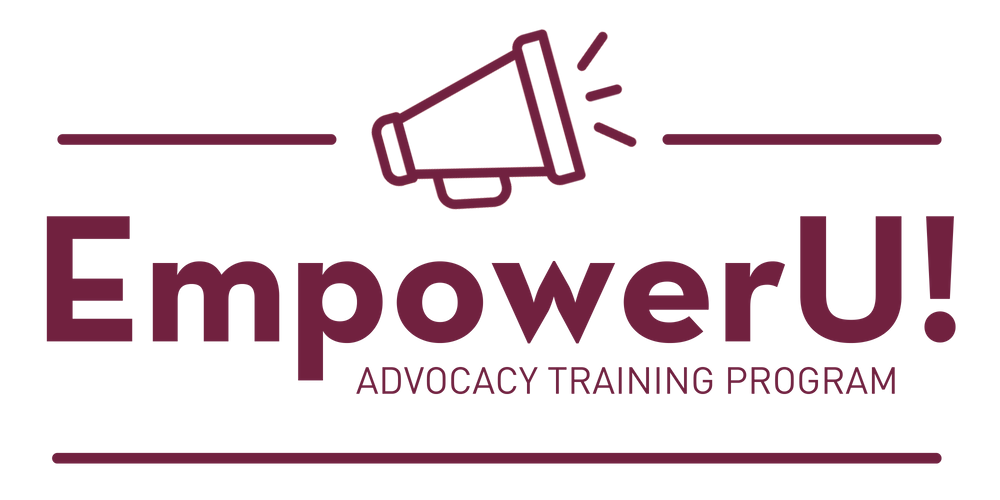
EmpowerU
EmpowerU! Advocating Natural Resource Conservation and Management
Learn how to work with decision makers, influence management decisions, and make a difference in your community!

Overview
Have you been working on natural resource issues but feel compelled to do more? Taking part in the EmpowerU Advocacy Training Program will move your natural resource work to the next level!
In this 4-6 week course, master volunteers and natural resources professionals can grow their skills to meaningfully engage decision makers about natural resource issues. Through a series of self-paced online learning activities and one in-person workshop, participants will:
- Gain understanding of the roles and levels of government and who to contact regarding natural resource management
- Learn to use skills such as influence, power, persuasion, framing, questioning and listening in interactions with decision makers
- Know where to find reputable information on natural resources in your area
- Create an engagement plan and experience practicing it in a safe, peer-learning environment
- See yourself as a resource to decision makers on natural resource management
- View engagement with decision makers as a norm and encourage others to do it
- Network with other people passionate to make a difference for natural resources
Target Audience
This program is open to natural resource volunteers and anyone else who has an interest in developing skills to engage decision-makers about natural resource management. Virginia Master Naturalist volunteers are our primary audience, but others are welcome to participate.
Course Outline and Expectations
- Course length: 5-6 weeks
- Delivery method: online with self-paced portions and three live Zoom workshops
- Time commitment: Participants will complete 8 online modules which should take about one hour each. We will have three Zoom workshops of up to 2 hours each. Each workshop is different and builds upon the previous, so participants need to plan on attending all three. The Zoom workshops will not be recorded, as they will be highly interactive with one-on-one and small group exercises.
- 2025 Course Timeline:
- October 10 – November 24: Participants go through the self-paced online course. We suggest that you use the deadlines indicated below to complete the modules, but you may choose to complete them more quickly.
- Tuesday, October 28, 6:30 – 8:30 pm: Workshop #1 (live on Zoom). Participants should complete online modules 1, 2, and 3 by this date.
- Monday, November 10 – 6:30-8:30 pm – Workshop #2 (live on Zoom). Participants should complete online modules 4, 5, and 6 by this date.
- Monday, November 24, 6:30-8:30 pm – Workshop #3 (live on Zoom). Participants should complete online modules 7 and 8 (including their engagement plans) by this date.
- Technology requirements:
- We will be using a program called Canvas as the online course delivery system. You will need reliable internet access and a computer or mobile device with an updated web browser. In addition, you will need the ability to play media content (including audio and video).
- Supported operating systems and web browsers: Canvas runs on Windows, Mac, Linux, iOS, Android, or any other device with a modern web browser. Canvas supports the last two versions of every browser release. We highly recommend updating to the newest version of whatever browser you are using as well as the most up-to-date Flash plug-in. Learn more about which browsers Canvas supports here: Which browsers does Canvas support?
- Word processing software such as Microsoft Word or Google Docs to write your Engagement Plan.
- Adobe Acrobat Reader or another supported PDF reader.
Course Learning Objectives
During the online modules, participants will:
- Learn about engagement
- Learn how to find reliable information
- Identify who can solve specific natural resource problems
- Understand influence, power and persuasion
- Review best practices for listening and questioning
- Learn about framing an issue
- Create a plan to engage the right people to move their natural resource issue forward
These skills are introduced and then incorporated into your personalized Engagement Plan via assignments within the online learning modules. By the end of the online course, you will have a 4-6 page roadmap to address your natural resource engagement issue. You will need to complete your plan a few days before the final Zoom session so the instructor can review it.
During the required Zoom workshops participants will:
- Meet others passionate about natural resources
- Practice assessing the reliability of information sources
- Practice reflective listening
- Develop questions and frame issues
- Practice one-on-one meeting skills or presenting at a public meeting
- Review your engagement plan with others to make it better
How To Register for the 2025 Course
- Complete the online registration form by October 9, 2025. The course is limited to 30 people, accepted on a first come-first served basis, so registration may close earlier. Please only register if you can commit to completing the online coursework and attending the three Zoom sessions.
- Participants who have registered and been accepted will receive access to the online course materials on or around October 10.
- What about the course fee? It’s free, thanks to funding from the Renewable Resources Extension Act!
- Questions? Please contact masternaturalist@vt.edu.
Wait, I Thought Virginia Master Naturalist Volunteers Couldn’t Engage in Advocacy?
Not all engagement with decision-makers is political advocacy! Please know that there are some types of engagement you might do with decision-makers that could count as VMN volunteer service, with the approval of your chapter. For example, you and other members of your chapter might adopt a local park and engage in discussions with the park manager in order to advocate for more management of invasive plants in the park. \This sort of engagement is not political advocacy and could legitimately be part of a VMN project. \This training is not focused specifically on lobbying elected officials or getting legislation passed, but rather on engaging the right decision-maker for the change you hope to make.
In addition, although you cannot engage in political advocacy for VMN volunteer hours or officially representing the VMN program, there might be advocacy you wish to do on your personal time. Sometimes we want to provide training and tools that will be useful to you outside of your VMN volunteer work! We certainly encourage individuals to be engaged in natural resource decision-making in their local communities if they want to be, and this workshop may help you be more effective in those efforts. This training (both the online and in-person components) meets the criteria for VMN Continuing Education hours.
Third, this training is not solely for VMN volunteers. We welcome other individuals who have an interest in doing more to address natural resource issues in their communities.
Is This Only About Natural Resources?
This course, and its assignments, will focus on natural resources as the topic of engagement, but the civic engagement content could be used for many different issues. One past participant immediately took the information she learned in this course and applied it to a local school board issue. You need to focus on natural resources for this course, but we realize you may find value in the information beyond your engagement as a volunteer or landowner.
Testimonials – Quotes from our 2024 EmpowerU Participants
“The resource materials were also extremely valuable and I will be referring to them again and again.”
“I really learned a lot from this course. I highly recommend more VMNs take the course. I always judge the value of an experience by how much I think about it afterwards and I have thought about this many times. It’s given me confidence and ideas on how to approach issues I care deeply about.”
“The interactive exercises were well-designed and yielded very helpful feedback. The modules were thought provoking and avoided overloading us, while at the same time offering sources for doing optional deeper dives.”
“I think it was very needed in this time and helpful to offer online throughout the state.”
Project Partners and Sponsors
The original curriculum development for this training was supported by a grant from the Renewable Resources Extension Act (RREA). The RREA is a program within the United States Department of Agriculture’s National Institute of Food and Agriculture. Educators at University of Minnesota Extension were the primary investigators for the grant and the curriculum developers, and Virginia was one of many states originally partnering to administer the program. Our 2025 offering of the program is also supported by RREA funding.
Connect with Us
For general inquiries about the Virginia Master Naturalist program, please contact:
masternaturalist@vt.edu540-231-0790